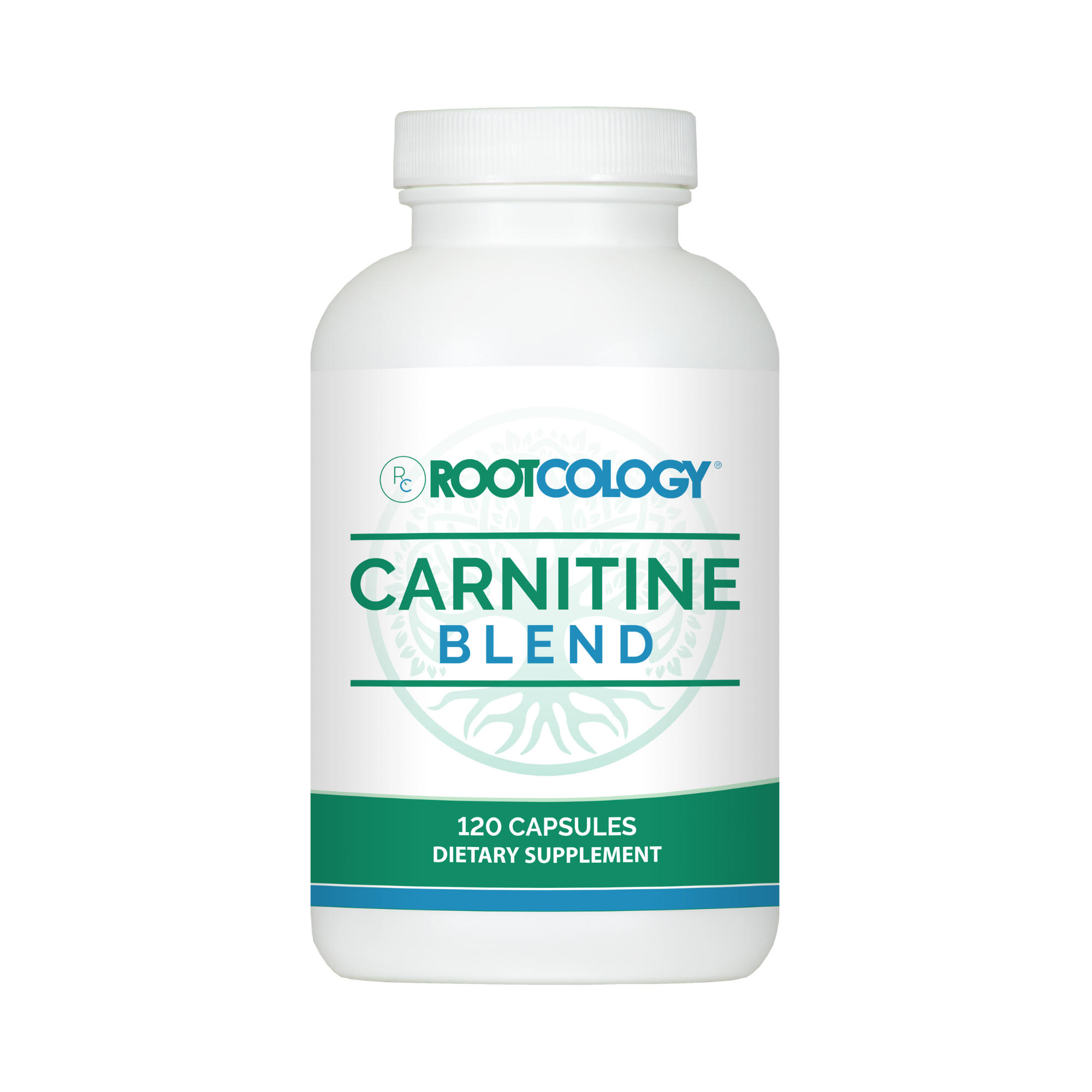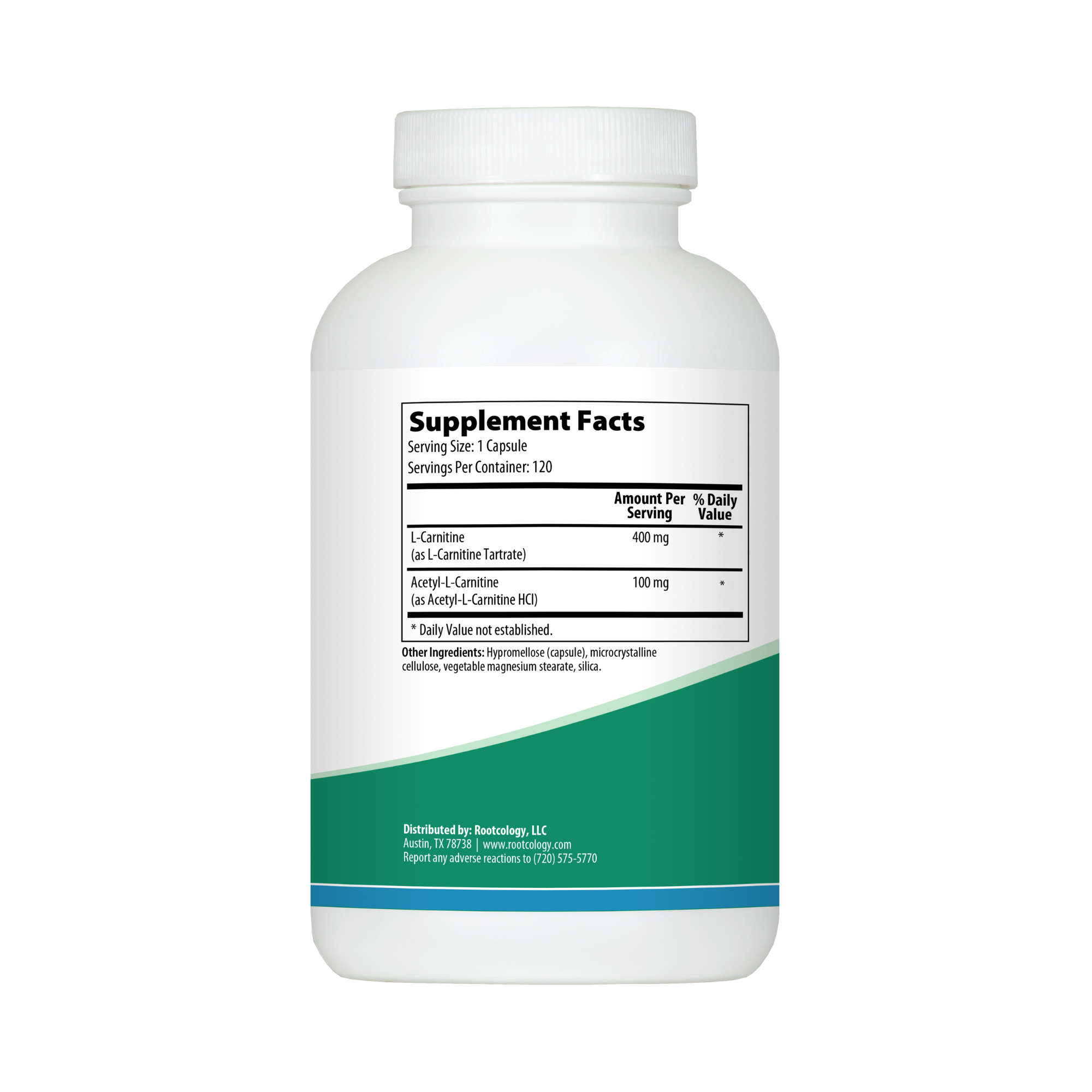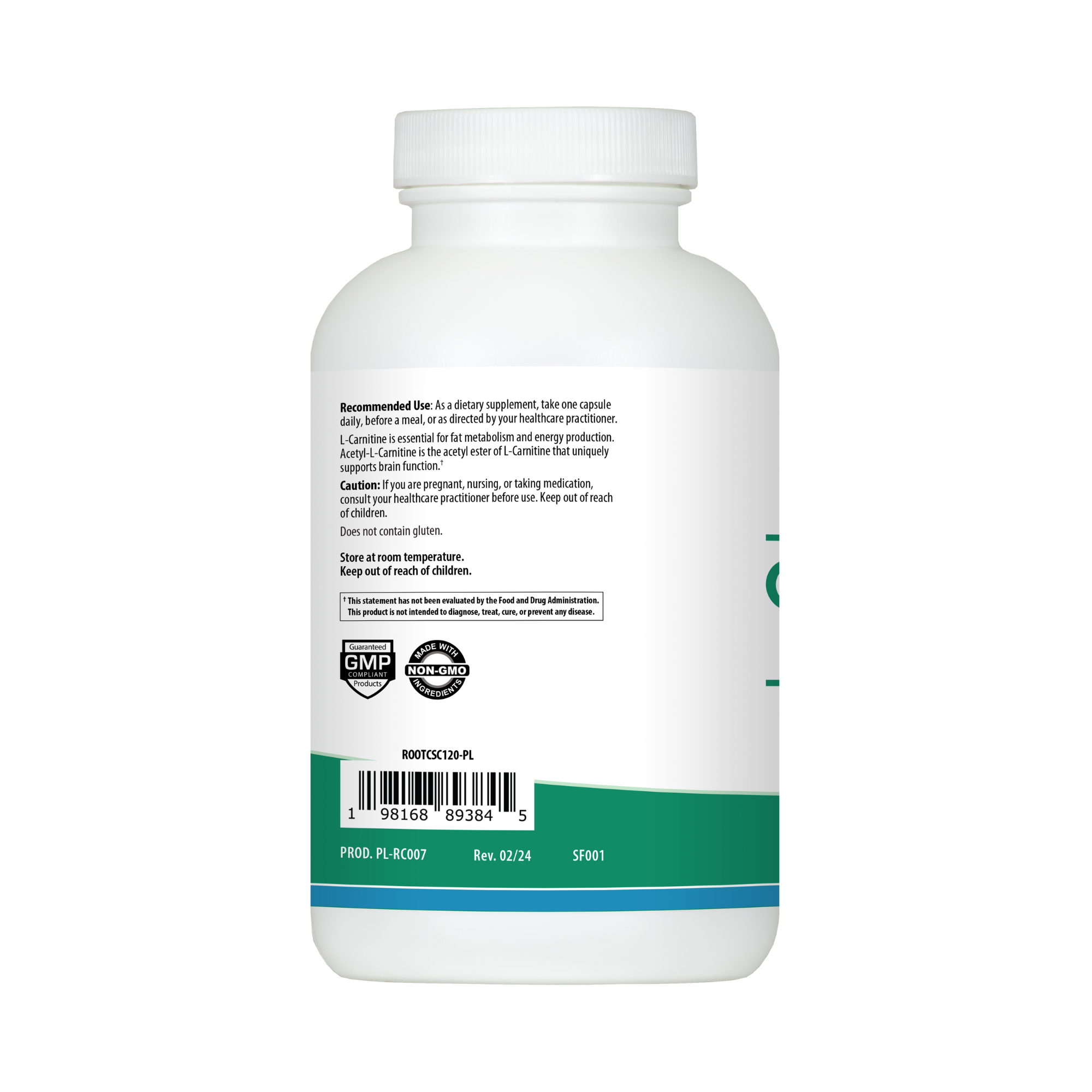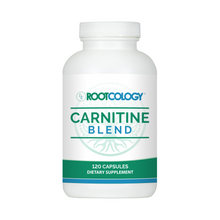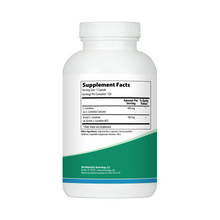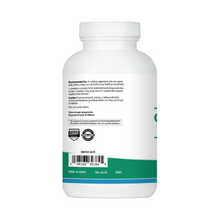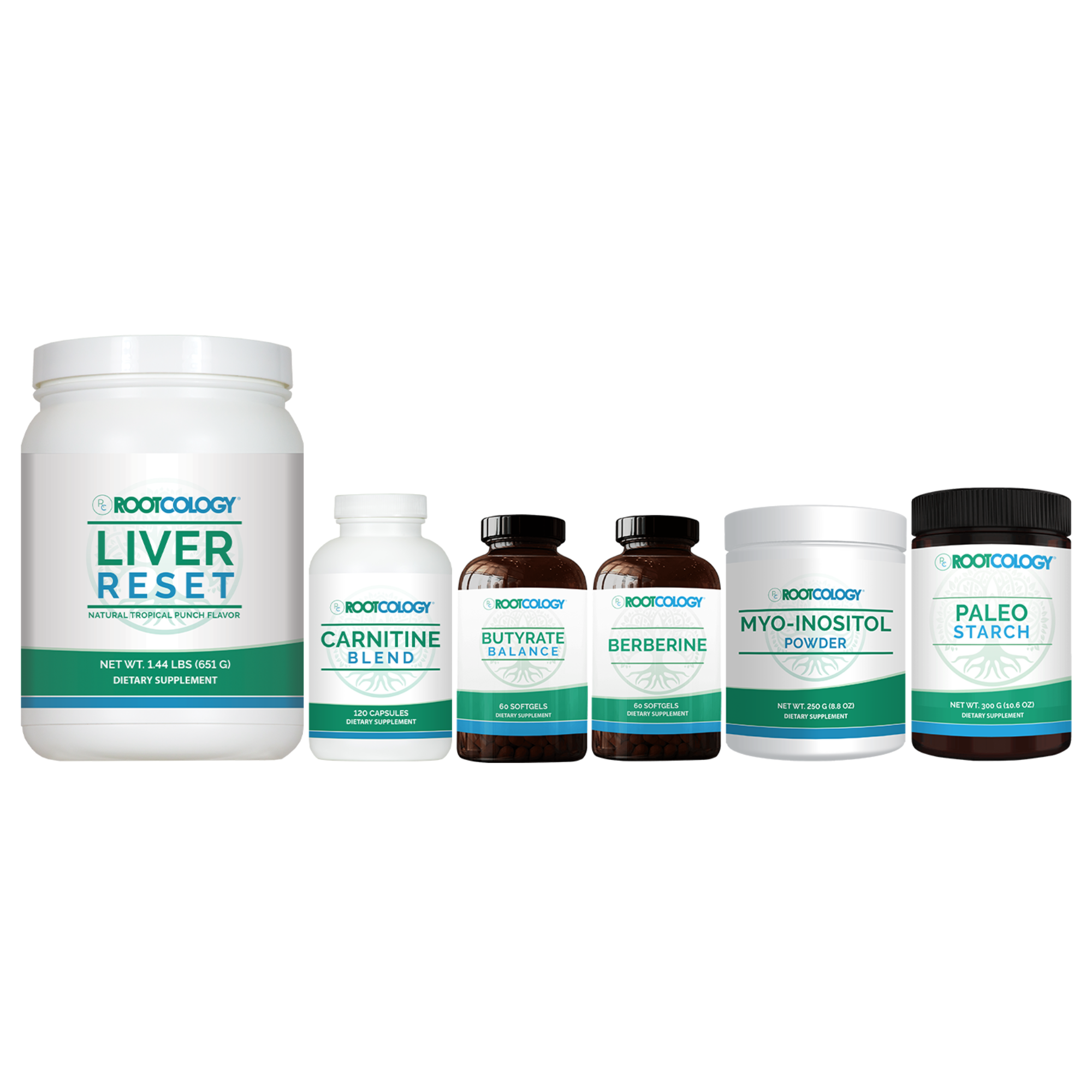What is Carnitine Blend?
Carnitine Blend combines 400 mg L-carnitine and 100 mg acetyl-L-carnitine, in one convenient capsule. L-carnitine is a derivative of amino acids and naturally occurs in foods, but significant amounts are only found in dark meats (due to high concentrations of mitochondria). L-carnitine is known for its role in supporting muscle strength, normal fat metabolism, and healthy energy production. Carnitine Blend also contains acetyl-L-carnitine, which has unique brain-supportive properties.*
What are the benefits of Carnitine Blend?
Carnitine Blend provides support for people on vegetarian diets, or when dark meats are consumed in small amounts. It also supports exercise performance through encouraging the body to burn fat during exercise, supports energy levels by assisting in the transport of fats as a fuel source, and supports healthy weight management by assisting the body's ability to build muscle and burn fat.*
Does Carnitine affect thyroid hormones?
Carnitine has traditionally been used by individuals with hyperthyroidism to help with symptoms resulting from hyperthyroid-induced carnitine depletion (such as muscle wasting), so scientists initially believed that carnitine acted like an “antagonist” or a thyroid hormone receptor blocker, and cautioned against using carnitine in hypothyroidism. However, subsequent research has shown that carnitine acts to modulate thyroid hormones within our cells, so it can act like an “agonist” (a substance that initiates a response when combined with a receptor) helping thyroid hormone action in cases of hypothyroidism, and as an “antagonist” (blocker) in cases of hyperthyroidism. Studies have shown benefits in both hypothyroidism and hyperthyroidism. As a best practice with all interventions used for Hashimoto’s, I recommend tracking symptoms, testing thyroid hormone levels and testing thyroid antibodies after starting new therapies.*
What is the recommended dose?
The recommended dose is one capsule per day.
When should I take it?
Take one capsule before a meal.
How long can I take Carnitine Blend?
Carnitine Blend is recommended to be taken for 3 months to 2 years.
Can it be taken with thyroid medications?
Carnitine Blend should be taken at least 30 to 60 minutes away from thyroid medications.
Are there any side effects that I should be aware of when taking Carnitine Blend?
Carnitine does have a "moving" mechanism, so taking too much may cause loose stools. Other possible side effects of L-Carnitine can include agitation, dry mouth, headache, insomnia, reduced appetite, and may cause a fish-like body odor.
Not to be used with peripheral vascular disease, high blood pressure, liver disease due to alcoholism (cirrhosis), diabetes, kidney disease, or a history of seizures. Do not use if you are allergic or sensitive to any of the ingredients in this supplement.
DO NOT TAKE if taking the following medications: AZT, doxorubicin, isotretinoin (Accutane), valproic acid (Depakote), or blood thinners.
Carnitine may also affect Hormone Replacement Therapy, and may increase or cause an imbalance in testosterone levels.
- Benvenga S, Amato A, Calvani M, Trimarchi F. Effects of Carnitine on Thyroid Hormone Action. NY Acad Sci. 2005;1033:158-167. doi:10.1196/annals.1320.015
- Marcon M, Mocelin R, de Oliveira DL, et al.. Acetyl-L-carnitine as a putative candidate for the treatment of stress-related psychiatric disorders: Novel evidence from a zebrafish model. Neuropharmacology. 2019 May 15;150:145-152.
- Sinclair C, Gilchrist J, Hennessey J, et al. Muscle carnitine in hypo- and hyperthyroidism. Muscle & Nerve. 2005. 32. 357-9.
- An JH, Kim YJ, Kim KJ, et al. L-carnitine supplementation for the management of fatigue in patients with hypothyroidism on levothyroxine treatment: a randomized, double-blind, placebo-controlled trial. Endocr J. 2016 Oct 29;63(10):885-895. Epub 2016 Jul 16.
- El-Sherbini ES, El-Sayed G, El Shotory R, et al. Ameliorative effects of l-carnitine on rats raised on a diet supplemented with lead acetate. Saudi J Biol Sci. 2017 Sep;24(6):1410-1417.
- Lau T, Bigio B, Zelli D, McEwen BS, Nasca C. Stress-induced structural plasticity of medial amygdala stellate neurons and rapid prevention by a candidate antidepressant. Mol Psychiatry. 2017 Feb;22(2):227-234.
- Longo N, Frigeni M, Pasquali M. Carnitine transport and fatty acid oxidation. Biochim Biophys Acta. 2016 Oct;1863(10):2422-35.
- Krajcovicová-Kudlácková M, Simoncic R, Béderová A, Babinská K, Béder I. Correlation of carnitine levels to methionine and lysine intake. Physiol Res. 2000;49(3):399-402.
- Karlsson F, Tremaroli V, Nielsen J, Bäckhed F. Assessing the human gut microbiota in metabolic diseases. Diabetes. 2013 Oct;62(10):3341-9.
- Keller U, van der Wal C, Seliger G, et al. Carnitine status of pregnant women: effect of carnitine supplementation and correlation between iron status and plasma carnitine concentration. Eur J Clin Nutr. 2009 Sep;63(9):1098-105.
- Covarrubias-Pinto A, Acuña AI, Beltrán FA, et al. Old things new view: ascorbic acid protects the brain in neurodegenerative disorders. Int J Mol Sci. 2015 Nov 27;16(12):28194-217.
- Barton-Wechsler B, Stachura DL, Ho E, et al. Effects of zinc supplementation on Carnitine and lactate concentrations in cultured liver cells The FASEB Journal. 2017.
- Picard M, McEwen BS. Psychological stress and mitochondria: a conceptual framework. Psychosom Med. 2018 Feb/Mar;80(2):126-140.
- Benvenga S, Ruggeri RM, Russo A, Lapa D, Campenni A, Trimarchi F. Usefulness of L-carnitine, a naturally occurring peripheral antagonist of thyroid hormone action, in iatrogenic hyperthyroidism: a randomized, double-blind, placebo-controlled clinical trial. J Clin Endocrinol Metab. 2001 Aug;86(8):3579-94.
- Benvenga S, Feldt-Rasmussen U, Bonofiglio D, et al. Nutraceutical supplements in the thyroid setting: health benefits beyond basic nutrition. Nutrients. 2019 Sep 13;11(9). pii: E2214.
- Moncayo R, Moncayo H. Applying a systems approach to thyroid physiology: Looking at the whole with a mitochondrial perspective instead of judging single TSH values or why we should know more about mitochondria to understand metabolism. BBA Clin. 2017 Apr 4;7:127-140.
- Fariduddin MM, Bansal N. Hypothyroid Myopathy. StatPearls [Internet]. Published January 2019. Accessed June 16, 2020. https://www.ncbi.nlm.nih.gov/books/NBK519513/
- Sayed-Ahmed MM. Role of carnitine in cancer chemotherapy-induced multiple organ toxicity. Saudi Pharm J. 2010 Oct;18(4):195-206.
- National Institutes of Health. Carnitine: What Is It? https://ods.od.nih.gov/factsheets/Carnitine-HealthProfessional/#en27. Updated October 10, 2017.
- Bene, Judit & Hadzsiev, Kinga & Melegh, Bela. (2018). Role of carnitine and its derivatives in the development and management of type 2 diabetes. Nutrition & diabetes. 8. 8. 10.1038/s41387-018-0017-1.
- Demarquoy C, Demarquoy J. Autism and carnitine: A possible link. World J Biol Chem. 2019;10(1):7–16.
- Christensen J, Grønborg TK, Sørensen MJ, et al. Prenatal valproate exposure and risk of autism spectrum disorders and childhood autism. JAMA. 2013 Apr 24;309(16):1696-703.
- Qiliang L, Wenqi S, Hong J. Carnitine deficiency in chinese children with epilepsy on valproate monotherapy. Indian Pediatr. 2018 Mar 15;55(3):222-224.
- Cho MK. Thyroid dysfunction and subfertility. Clin Exp Reprod Med. 2015;42(4):131–135.
- Agarwal A, Sengupta P, Durairajanayagam D. Role of L-carnitine in female infertility. Reprod Biol Endocrinol. 2018 Jan 26;16(1):5.
- Sharma S, Black SM. Carnitine homeostasis, mitochondrial function and cardiovascular disease. Drug Discov Today Dis Mech. 2009;6(1-4):e31-e39.
- Irie J, Kanno Y, Kikuchi R, et al. L-Carnitine improves gastrointestinal disorders and altered the intestinal microbiota in hemodialysis patients. Biosci Microbiota Food Health. 2017;36(1):11-16.
- Semba RD, Trehan I, Li X, et al. Environmental enteric dysfunction is associated with carnitine deficiency and altered fatty acid oxidation. EBioMedicine. 2017 Mar;17:57-66.
- Obrenovich MEM. Leaky gut, leaky brain? Microorganisms. 2018 Oct 18;6(4). pii:E107.
- Fröhlich E, Wahl R. Microbiota and thyroid interaction in health and disease. Trends Endocrinol Metab. 2019 Aug;30(8):479-490.
- Macfabe D. Autism: metabolism, mitochondria, and the microbiome. Glob Adv Health Med. 2013;2(6):52–66.
- Carnitine. Treat Autism. Published October 8, 2012. Accessed June 16, 2020. http://treatautism.ca/2017/10/08/carnitine/
- Ziats MN, Comeaux MS, Yang Y, et al. Improvement of regressive autism symptoms in a child with TMLHE deficiency following carnitine supplementation. Am J Med Genet A. 2015 Sep;167A(9):2162-7.
- Vernon, S.D., Whistler, T., Cameron, B. et al. Preliminary evidence of mitochondrial dysfunction associated with post-infective fatigue after acute infection with Epstein Barr Virus. BMC Infect Dis. 2006;6:15. doi:10.1186/1471-2334-6-15
- Murata S, Inoue K, Aomatsu T, Yoden A, Tamai H. Supplementation with carnitine reduces the severity of constipation: a retrospective study of patients with severe motor and intellectual disabilities. J Clin Biochem Nutr. 2017;60(2):121–124.
- Ringseis R, Hanisch N, Seliger G, et al. Low availability of carnitine precursors as a possible reason for the diminished plasma carnitine concentrations in pregnant women. BMC Pregnancy Childbirth. 2010 Apr 25;10:17.
- Crill CM, Storm MC, Christensen ML, et al. Carnitine supplementation in premature neonates: effect on plasma and red blood cell total carnitine concentrations, nutrition parameters and morbidity. Clin Nutr. 2006 Dec;25(6):886-96.
- Ghatak T, Azim A, Mahindra S, Ahmed A. Can Klebsiella sepsis lead to hyperammonemic encephalopathy with normal liver function?. J Anaesthesiol Clin Pharmacol. 2013;29(3):415–416. doi:10.4103/0970-9185.117079
- Natural Medicines Therapeutic Research Collaboration. https://naturalmedicines.therapeuticresearch.com/. Accessed August 11, 2020.
- Kraemer WJ, Spiering BA, Volek JS, et al. Androgenic responses to resistance exercise: effects of feeding and L-carnitine [published correction appears in Med Sci Sports Exerc. 2006 Oct;38(10):1861]. Med Sci Sports Exerc. 2006;38(7):1288-1296. doi:10.1249/01.mss.0000227314.85728.35
You May Also Like
Questions about Rootcology Products? Email info@rootcology.com and we will get back to you within 24 business hours.




